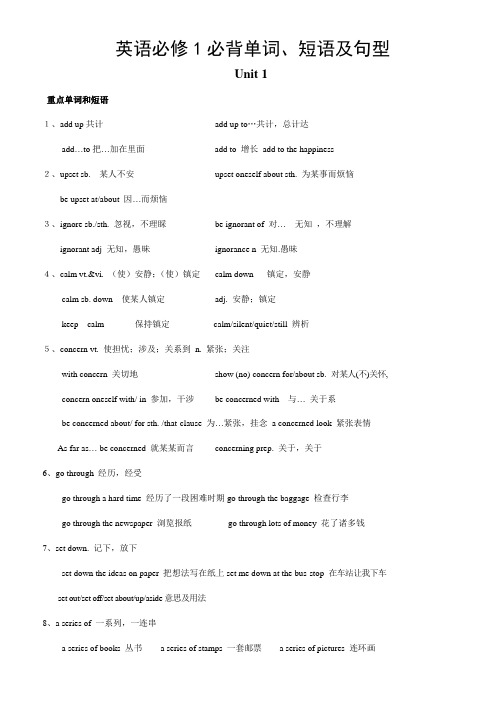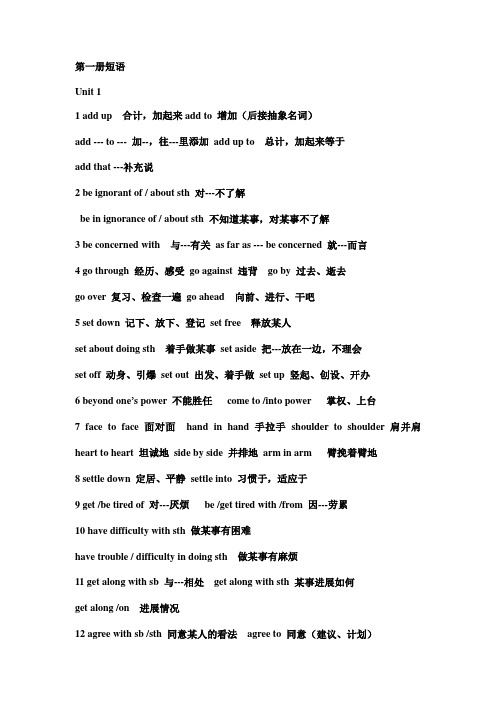EP1 短语学
2021年高一英语人教版必修一全册重点单词短语及句型归纳

英语必修1必背单词、短语及句型Unit 1重点单词和短语1、add up共计add up to…共计,总计达add…to把…加在里面add to 增长add to the happiness2、upset sb. 某人不安upset oneself about sth. 为某事而烦恼be upset at/about 因…而烦恼3、ignore sb./sth. 忽视,不理睬be ignorant of 对…无知,不理解ignorant adj 无知,愚昧ignorance n 无知.愚昧4、calm vt.&vi. (使)安静;(使)镇定calm down 镇定,安静calm sb. down 使某人镇定adj. 安静;镇定keep calm 保持镇定calm/silent/quiet/still 辨析5、concern vt. 使担忧;涉及;关系到n. 紧张;关注with concern 关切地show (no) concern for/about sb. 对某人(不)关怀, concern oneself with/ in 参加,干涉be concerned with 与…关于系be concerned about/ for sth. /that-clause 为…紧张,挂念a concerned look 紧张表情As far as… be concerned 就某某而言concerning prep. 关于,关于6、go through 经历,经受go through a hard time 经历了一段困难时期go through the baggage 检查行李go through the newspaper 浏览报纸go through lots of money 花了诸多钱7、set down. 记下,放下set down the ideas on paper 把想法写在纸上set me down at the bus-stop 在车站让我下车set out/set off/set about/up/aside意思及用法8、a series of 一系列,一连串a series of books 丛书 a series of stamps 一套邮票 a series of pictures 连环画9、on purpose 故意地= by design= deliberately by chance/accident= accidentallylie to sb. on purpose 故意向某人撒谎for/with the purpose of 为了…地目10、in order to/ so as to (do sth.) 为了,以……为目so as to “为了”,只能用在主句后。
人教版高中英语第一册短语

第一册短语Unit 11 add up 合计,加起来add to 增加(后接抽象名词)add --- to --- 加--,往---里添加add up to 总计,加起来等于add that ---补充说2 be ignorant of / about sth 对---不了解be in ignorance of / about sth 不知道某事,对某事不了解3 be concerned with 与---有关as far as --- be concerned 就---而言4 go through 经历、感受go against 违背go by 过去、逝去go over 复习、检查一遍go ahead 向前、进行、干吧5 set down 记下、放下、登记set free 释放某人set about doing sth 着手做某事set aside 把---放在一边,不理会set off 动身、引爆set out 出发、着手做set up 竖起、创设、开办6 beyond one’s power 不能胜任come to /into power 掌权、上台7 face to face 面对面hand in hand 手拉手shoulder to shoulder 肩并肩heart to heart 坦诚地side by side 并排地arm in arm 臂挽着臂地8 settle down 定居、平静settle into 习惯于,适应于9 get /be tired of 对---厌烦be /get tired with /from 因---劳累10 have difficulty with sth 做某事有困难have trouble / difficulty in doing sth 做某事有麻烦11 get along with sb 与---相处get along with sth 某事进展如何get along /on 进展情况12 agree with sb /sth 同意某人的看法agree to 同意(建议、计划)agree on 就---达成一致意见13 be good at sth /doing sth 擅长做某事do well in 在---做得好be skilled in /at 精通14 communicate sth to do 向某人传递communicate with 与---交流15 have an interest in sth 对—有兴趣lose interest in 对---不再感兴趣show /take an interest in 对---有兴趣have /take /feel no interest in 对---不感兴趣develop an interest in 对---产生兴趣第二单元1 go on /make /take a sea voyage 去航海旅行be on a voyage to 正在往---航行2 come to涉及、谈到、总计、达到come on 来吧、快come over 顺便来访come out暴露、出版come about 发生、造成come across 碰见、偶然发现come up with 提出、想出3 in fact 实际上as a matter of fact 实际上、事实上4 base --- on /upon 把---建立在---上be based on /upon 以---为根据5 at present 目前、现在be present 出席for the present 暂时present sth to sb 把某物赠给某人present sb with sth 把某事赠给某人6 make good use of 好好利用、使用make full use of 充分利用make the best of 充分利用make the most of 充分利用7 make sense of 理解、明白in a sense 在某种意义上come to one’s senses 醒过来,醒悟过来in no sense 无论如何都不a sense of humor 幽默感8 on second thoughts 经重新考虑be deep /lost in thought 沉思at the thought of 一想到without thought 不经思考地9 be at sb’s command 听侯某人的吩咐have a good command of 精通be under one’s command 由---指挥command sb to do sth 命令某人做某事10 make a request for sth 要求某物、需要某物make a request that 要求、需要at the request of /one’s requst 在---的要求下request sth 要求某物request sth from sb 向某人索要某物request sb to do sth 要求某人做某事request that sb do sth 要求某人做---11 hold on 别挂断、等一下、坚持住hold up 支撑、推迟hold back 阻挡12 to tell the truth说实话to be honest 老实说to begin /start with 首先judging by / from 从----来判断generally speaking 一般来说in other words 换句话说in a word 总之、一句话what’s more 另外、而且what’s worse 更糟糕的是13 recognize one’s voice辨认出某人的声音be recognized as 被承认为recognize sb to be 承认某人是14 straight away /off 立刻、马上straight out 坦率的Unit 31 prefer to do /doing sth 更喜欢做某事prefer doing sth to doing sth 与做---相比更喜欢做---prefer to do sth rather than do sth 宁愿做---而不愿做---prefer sb to do sth 宁愿某人做某事prefer that 宁愿2 dreama sweet /terrible dream 做甜蜜的梦,可怕的梦die a heroic death 死得英勇live a happy /hard life 过着幸福、艰难的生活breathe a deep breath 深呼吸laugh a merry laugh 开心一笑smile a weak / forced smile 笑得勉强sleep a sound sleep 熟睡一觉3 persuade sb to do sth /into doing sth 说服某人做某事persuade sb not to do sth / out of doing sth 说服某人不做某事persuade sb of sth /that 使某人相信4 graduate from 毕业于---,从---毕业graduate in 毕业于----专业5 care about 关心、忧虑、介意、在乎care for 关怀、照顾、喜欢、对---有兴趣take care注意、当心take care of 照顾、负责with care 当心、仔细地6 determine to do sth 决心做某事determine on doing sth 决定做某事determine sb to do sth 使某人决心做某事be determined to do sth 下决心做某事7 keep one’s mind on sth 专心、注意、聚精会神做某事lose one’s mind 失去理智bear /keep --- in mind 记住8 give in 屈服、投降、让步、上交give away 泄露、赠送、免费给予give back 归还、恢复give over 交付、托付give up 放弃、认输give off 放出、散发give out 分配、分发、用光、筋疲力尽9 than usual 比平常as before 像以前那样as ever 像以往那样as usual照常10 in one’s view 在某人看来in view of sth 鉴于、考虑到、由于in view 看得见、在视野之内out of view 看不见、在视野之外point view 观点at first view 一见就---come into view 进入视野、被看见11 have fun 玩得高兴in /for fun 开玩笑地make fun of 取笑、玩弄Don’t make fun of others .不要取笑他人12 put up 举起、张贴、建造、搭起、提供食宿put away 把---收起来、存放put down放下、记下、镇压put forward 提出、呈上put off推迟、延期put on 穿上、演出put out 扑伸出13 at midnight 在午夜at dawn 在黎明at noon 在中午at dusk 在傍晚at night 在夜里in the morning 在早晨in the afternoon 在下午in the evening 在晚上Unit 41 There seems to be --- 似乎有---There used to be --- 曾经有----There happened to be --- 碰巧有--- There is sure /certain to be --- 肯定有- There is likely to be --- 可能有--- There remain / lie / live / exist /stand --- 有---- 2 shake hands with sb 与某人握手shake sb by the hand = shake one’s hand 与某人握手shake one’s head 摇头shake with anger / fear /laughter 气的、怕的、笑的发抖shake like a leaf 全身发抖3 burst into tears / burst out crying 突然哭起来burst into laughter / burst out laughing 突然笑起来4 think much / highly /a lot of 重视、看重,对---的评价高think nothing / little of 轻视,认为没什么了不起5 come / go to ruin 毁灭bring sth /sb to ruin 使毁灭、使破产fall into ruins 变成废墟ruin one’s hopes 使某人的希望破灭ruin oneself 自我毁灭6 come / go to sb’s rescue 去营救某人resue sb /sth from 把某人从---解救出7 be trapped in 困在---中,陷在---中trap sb into doing sth 诱骗某人做某事lay / set a trap 设置陷阱walk /fall into a trap 钻进某人的圈套8 be buried in thought 陷入沉思be buried in doing sth = bury oneself in doing sth 埋头于-- ,专心于---。
人教版八年级上册Unit 1 重点短语

八年级上册Unit 1 Where did you go on vacation?重点短语go on vacation去度假=be on vacationstay at home待在家里go to the mountains去爬山go to the beach去海滩visit museums 参观博物馆visit my uncle 拜访我的叔叔go to summer camp去参加夏令营go with sb. 和某人一起去long time no see.好久不见quite a few相当多not really 没干什么most of the time 大多数时间go out with sb.和某人一起外出taste good 尝起来不错have a good time玩得开心,过的愉快my first time there 我第一次去那in the countryside在乡下there be nothing much to do but do (A)除了做A事以外,没其他事可做seem to do sth.似乎,好像做某事keep a diary记日记the fun park 游乐园study for为……而学习of course当然arrive in +大地点到达decide to do sth. 决定做某事try doing sth.尝试做某事feel like给……的感觉;感受到feel like doing sth 想要ride bycicles to 骑车去某地go shopping去购物in the past在过去walk around四处走走enjoy doing 喜欢做某事make a difference 起作用,有不同,成功walk up to 走向...start doing sth 开始做某事wait for 等候,等待too many 太多get to the top 到达山顶rain hard 雨下地大because of因为bad weather 糟糕的天气one bowl of…一碗……the next day第二天forget to do sth 忘记做某事along the way 沿路another two hours 再来两个小时the top og the hill 山顶drink tea喝茶find out找出;查明so...that...如此...以至于...go on继续something important一些重要的事up and down上上下下come up出来take photos照相the last five hours 过去的五个小时。
北师大版必修一unit 1 重要单词短语总结

Words and Phrases
• 1 wake up 醒来 • 2 get up 起床 开 • 3 turn/switch on 调大声/ 出现 turn/switch off 关 turn up turn down 调小声/拒绝 向某人求助 turn to sb for help • 4 at the moment 就在那时 • 5 switch over 换 • 6 for 时间持续多久 I will stay for 4 days.
• 7 work one’s way through sth
从头到尾做某事,实现目标 • 8 as soon as / the moment 一……就
• 9 get changed/ dressed/ paid /bored/ lost get wet/ hurt get+形容词 •get+过去分词 get on 进展/上 10 take up 占据/ 从事/开始学..课程 • 11 go off 响,爆炸 go by 时间流逝,经过,放过 • go through 经历,穿过 go on 继续 • go over go into details 详细描述 复习 • 12 the first/last to do sth
• • • • • • • • • • • •
36 distance learning/ education 37 suppose sb/sth (to be) +名词/形容词 be supposed to do 理应做 觉得某人… 38 prevent/stop sb (from) doing sth keep sb from doing sth 阻止某人做 prevent sb from 保护…使其免受伤害 39 suffer from 遭遇 40 be proud of / take pride in 以..为骄傲 41 to be honest/ honestly speaking 老实说 generally speaking 一般来说/严格/坦白地说 42 add to 增加 add A to B 把 A加到B上 add up to 总共有
人教版高中英语必修一unit1重点词汇短语句型

add sth to sth 把….加到….. 3. Finish doing sth 完成做 4. not…..until 直到…..才…. 5. help sb (to) do sth 帮助某人做某事
be afraid to do sth 害怕做某事 25. Set down 记下 26. a series of 一系列的 27. Want to do
want sb/sth to do sth
BOOK1 Unit1
14. be concerned about 关心 be concerned with 与….有关 As far as I’m concerned, 句子 “就我而言……”
15. On holiday/vacation 度假 16. take care of = look after 照顾 17. While walking the dog, you were careless. 分词作状语 18. By yourself 亲自 19. Your friend who doesn’t work hard asks you to help her cheat in the exam. 定语从句
BOOK1 Unit1
20. Should have done sth 本应该做某事而没做 could have done sth 本来能够做某事但是没有做
21. Do you want a friend whom you could tell everything to?定语从句 22. Go through 经历 23. Laugh at sb 嘲笑某人 24. Be afraid that +句子
英语必修一unit1的重点单词短语句型

英语必修一unit1的重点单词短语句型Key Words:1. Acquaintance: A person known to one but usually not a close friend. Example sentence: I met John at a party last night. He seems like a nice acquaintance.2. Ally: A person who cooperates with another in order to achieve a common goal.Example sentence: The two countries formed an alliance to fight against terrorism.3. Companion: A person who accompanies or spends time with another.Example sentence: My dog Charlie is my loyal companion.4. Trustworthy: Able to be relied on as honest or truthful.Example sentence: Sarah is a trustworthy friend. I can always count on her to keep a secret.5. Loyal: Giving or showing unwavering support or allegiance to someone or something.Example sentence: Despite the challenges, John remained loyal to his team till the end.6. Dependable: Able to be trusted or relied on.Example sentence: Tom is a dependable friend. Whenever I need help, he is there for me.7. Respectful: Feeling or showing deference and respect.Example sentence: It is important to be respectful towards your elders.8. Genuine: Truly what something is said to be; authentic.Example sentence: I appreciate people who are genuine and honest.9. Enthusiastic: Having or showing intense and eager enjoyment, interest, or approval.Example sentence: Lucy is always enthusiastic about trying new things.10. Frank: Open, honest, and direct in speech or writing.Example sentence: I appreciate your frankness in telling me the truth.Key Phrases:1. Keep in touch: To maintain regular communication with someone.Example sentence: Even though we live far apart, we try to keep in touch through phone calls and video chats.2. Get along with: To have a friendly and harmonious relationship with someone. Example sentence: Jack gets along well with all his classmates.3. Fall out with: To have a disagreement or argument with someone that leadsto the end of a friendship.Example sentence: Rachel fell out with her best friend after they had a misunderstanding.4. Make up: To reconcile after a disagreement or argument.Example sentence: After their fight, Jane and Maria made up and are friends again.5. Let down: To disappoint or fail to support someone who was relying on you. Example sentence: Mark felt really let down when his friend didn't show up for their planned outing.6. Break up: To end a romantic relationship.Example sentence: After years of dating, Sarah and Mike decided to break up.7. Come across: To meet or find by chance.Example sentence: I came across an old photo of us while cleaning out my closet.8. Hang out: To spend time with someone casually.Example sentence: We like to hang out at the park and play frisbee on the weekends.9. Put up with: To tolerate or endure someone or something unpleasant.Example sentence: It's not easy to put up with my noisy neighbors.10. Look up to: To admire or have great respect for someone.Example sentence: I look up to my older brother because he is very successful.Key Sentence Structures:1. Comparatives and Superlatives: This unit introduces the use of comparativesand superlatives to compare different qualities of people or things.Example sentences:- Mary is taller than her sister.- The Great Wall of China is one of the longest walls in the world.2. Irregular Verbs: Students will learn and practice using irregular verbs in sentences.Example sentences:- I went to the park yesterday.- He has sung in many concerts.3. Present Continuous Tense: The present continuous tense is used to describe actions happening at the time of speaking or ongoing actions.Example sentences:- We are watching a movie right now.- She is studying for her exams.4. Possessive Pronouns: Students will learn how to use possessive pronouns to indicate ownership.Example sentences:- This book is mine.- These shoes are theirs.5. Conditional Sentences: The unit introduces conditional sentences, which express hypothetical situations and their potential consequences.Example sentences:- If it rains tomorrow, we won't go to the beach.- If I study hard, I will pass the exam.6. Past Continuous Tense: The past continuous tense is used to describe actions that were happening at a specific time in the past or ongoing actions in the past.Example sentences:- I was sleeping when the phone rang.- She was cooking dinner when her friends arrived.7. Modal Verbs: Students will learn and practice using modal verbs to express possibility, permission, or obligation.Example sentences:- You can borrow my pen if you need it.- We should finish our homework before watching TV.8. Relative Pronouns: Relative pronouns are used to introduce relative clauses, which provide additional information about a noun or pronoun in the sentence. Example sentences:- The woman who is speaking to John is our teacher.- The book that you gave me is very interesting.9. Passive Voice: The passive voice is used when the focus is on the action being done to the subject, rather than the subject doing the action.Example sentences:- The letter was delivered to the wrong address.- The cake was baked by my sister.10. Reported Speech: Reported speech is used to tell someone what another person said, without using the exact words.Example sentences:- He said that he was tired.- She asked if I had finished my homework.。
英语必修一第一单元知识点总结
英语必修一第一单元知识点总结语言要点(模块)一、短语归纳1. 做个好朋友 to be a good friend2. 做下列调查 make the following survey3. 合计总分 add up the score4. 得分 get points5. 心烦意乱地来到学校come to school upset6. 不理会铃声 ignore the bell7. 使你那个德国朋友安静下来 calm down your German friend8. 关心你朋友 be concerned about your friend(s) 9. 松开了 get loose10. 不得不去户外遛狗 have got to walk the dog outdoors11. 帮他期末考试作弊 help him cheat in the end-of-term exam12. 列出理由make a list of reasons / list the reasons 13.记下一连串的要求 set down a series of requests14. 根据问卷调查 according to the questionnaire 15. 根据编辑的忠告 according to the editor’s advice16. 为了分担你的困难 in order to share your difficulties /troubles 17. 与老板相爱 fall in love with the boss18. 与我的同桌相处和谐 get along / on well with my deskmate19. 关心青少年 be concerned about teenagers20. 为了和老板面对面地交流 in order to communicate with theboss face to face21. 信任政府trust / believe in the government22. 经历了太多的战争 go through too many wars23. 相邻的城镇 neighboring towns 24. 相邻的国家 neighboring countries二、.词语辨析三.词性变化(旨在提供语法填空所需材料)四.重点辞汇1.survey n. 调查,勘察,检测The reporter made a survey of river pollution.短语make a survey of…做…调查。
初中英语(新人教版)必修一 Unit1 知识点归纳
初中英语(新人教版)必修一 Unit1 知识点归纳重点词汇- revolution: 革命- equal: 平等的- democracy: 民主- freedom: 自由- organization: 组织重点短语- set up: 建立- be equal to: 等于- fight for: 为...而战斗- dream of: 梦想着- give up: 放弃重点句型1. The French Revolution started in 1789 and lasted for 10 years.2. Everyone should be equal and have the right to vote.3. I dream of being a scientist in the future.4. It's important to fight for our rights and freedom.重点语法- 过去时:表示过去的动作或状态。
如:The event happened yesterday.(这件事发生在昨天)- 一般现在时:表示现在的动作、状态或经常性的事。
如:She goes to school every day.(她每天去上学)- 动词不定式:表示目的、结果或意图。
如:He studies hard to get good grades.(他努力研究以获得好成绩)难点解析本单元的重点在于了解法国革命的历史背景,学会运用一些常用的短语和句型表达自己的想法和梦想。
同时,掌握时态的用法和动词不定式的结构也是重点难点。
研究建议1. 阅读与听力:通读课文,重点理解文章的内容,不要拘泥于生词,尽量理解整体意思。
多听多读,培养语感。
2. 口语与写作:练运用本单元的重点短语和句型进行口头表达和写作。
可找伙伴进行对话练或写一个关于梦想的短文。
3. 语法与词汇:掌握本单元的重点词汇和语法结构,并进行相关练。
北师版 必修一 unit1 lifestyle 短语单词总结
get lost 迷路 get paid 得到报酬 get dressed 穿衣 get married 结婚 get hurt 受伤 get broken 损坏 get discouraged 灰心丧气
married (1) They plan to get _________(marry) in the summer. stolen (2) His car got ________(steal) at the weekend. broken break) while I (3) My watch got ________( was playing with the children.
(1)fill……with 用…..装满 请把杯子里装满水 Please fill the cup with water.
(2) fill in 填写上;塞满
你需要填写一些表格。 You need to fill in some forms.
6. What kind of lifestyle do you think the men have? 疑问词+do you think+陈述语序 双重疑问 句,常用来询问对方对某事的意见或者看法。 do you think 可以看成是插入语,类似的有: do you consider, do you know, do you believe, do you suppose
4. take up 占据(时间、空间);开始从事; 拿起;对….产生兴趣 take back 收回 take off 脱下 take on 呈现 take over 接管 take apart 拆开
5. be filled with = be full of 充满着 教室里面坐满了人 The classroom is filled with/ full of people.
外研版必修一第一单元 短语集合
第一单元晨读必备1.over and over again 一遍又一遍2.wake up 醒来,起床3.rush out of 从...冲出去4.in one's eagerness (to do) 迫不及待做某事5.turn around 向后转,转过来6.step into 迈入7.make a good first impression 留下第一个好印象8.it's one's turn 轮到某人9.breathe deeply 深呼吸10.put sb. under pressure 把某人置于压力之下11.depend on 依靠,依赖12.make the most/best of 充分利用13.make good use of 好好利用14.turn on 打开15.be prepared for 为...做好准备16.take part in 参加17.not only... but also... 不仅...而且18.care about 关心19.play a part (in) (在...方面)起作用20.take up 占据,占领;开始做...21.graduate from 从...毕业22.thank you for doing sth. 因做某事而表示感谢23.as if 仿佛,好像24.keep an open mind 保持开放的心态25.as much as possible 尽可能多26.for sure 确实,毫无疑问27.deal with 处理28.at the end of 在...的末尾29.at the sight of 一看见30.hold up 抬起,举起31.if so 如果这样32.look back on 回顾33.give sb. a hand 帮某人一把e to an end 结束35.around the corner 即将到来,在拐角处36.take down 记下,写下37.run out of 从...跑出去38.introduce oneself to 向某人介绍自己39.Well begun, half done.良好的开始是成功的一半。
- 1、下载文档前请自行甄别文档内容的完整性,平台不提供额外的编辑、内容补充、找答案等附加服务。
- 2、"仅部分预览"的文档,不可在线预览部分如存在完整性等问题,可反馈申请退款(可完整预览的文档不适用该条件!)。
- 3、如文档侵犯您的权益,请联系客服反馈,我们会尽快为您处理(人工客服工作时间:9:00-18:30)。
References
1 Knappe, Gabriele. (2004) Idioms and Fixed Expressions in English Language Study before 1800. Peter Lang.
2 Bally, Charles (1909 [1951]) Traitéde stylistique française. Genève: Georg et Cie.
第一节 短语学及其发展史
The earliest English adaptations of phraseology are by Weinreich (1969)[3] within the approach of transformational grammar), Arnold (1973),[4] and Lipka (1992 [1974]).[5]
8 Gläser, Rosemarie. 1998. The Stylistic Potential of Phraselological Units in the Light of Genre Analysis In A.P. Cowie (ed.), Phraseology. Oxford: Clarendon Press, page 125.
第一节 短语学及其发展史
Phraseology is a scholarly approach to language which developed in the twentieth century.[1] It took its start when Charles Bally's[2] notion of locutions phraseologiques entered Russian lexicology and lexicography in the 1930s and 1940s and was subsequently developed in the former Soviet Union and other Eastern European countries. From the late 1960s on it established itself in (East) German linguistics but was also sporadically approached in English linguistics.
第一节 短语学及其发展史
Bibliographies of recent studies on English and general phraseology are included in Welte (1990)[6] and specially collected in Cowie & Howarth (1996)[7] whose bibliography is reproduced and continued on the internet and provides a rich source of the most recent publications in the field.
For example, ‘Dutch auction’ is composed of the words Dutch ‘of or pertaining to the Netherlands’ and auction ‘a public sale in which goods are sold to the highest bidder’, but its meaning is not ‘a sale in the Netherlands where goods are sold to the highest bidder’. Instead, the phrase has a conventionalized meaning referring to any auction where, instead of rising, the prices fall.
Bibliography
Altenberg, Bengt. 1998. On the Phraseology of Spoken English: The Evidence of Recurrent Word-Combinations In A.P. Cowie (ed.), Phraseology. Oxford: Clarendon Press.
Amosova, N.N. 1963. Osnovi angliyskoy frazeologii. Leningrad.
Anscombre, Jean-Claude & Salah Mejri (eds.) 2011. Le figement linguistique : la parole en-travée. Paris: Honoré Champion.
Álvarez de la Granja, María (ed.). 2008. Fixed Expressions in Cross-Linguistic Perspective. A Multilingual and Multidisciplinary Approach. Hamburg: Verlag Dr. Kovac.
Cowie, A.P. 1998. Phraseology: Theory, Analysis, and Applications. Oxford: Oxford University Press.
In Great Britain as well as other Western European countries, phraseology has steadily been developed over the last twenty years.
The activities of the European Society of Phraseology (EUROPHRAS) and the European Association for Lexicography (EURALEX) with their regular conventions and publications attest to the prolific European interest in phraseology.
4 Arnold, I.V. (1973) The English Word Moscow: Higher School Publishing House
5 Lipka, Leonhard. 1992. An Outline of English Lexicology. Tübingen: Max Niemeyer Verlag.
3 Weinreich, Uriel (1969) Problems in the Analysis of Idioms. In J. Puhvel (ed.), Substance and Structure of Language, 23-81. Berkeley/Los Angeles: University of California Press.
第二节 短语的定义
According to Rosemarie Gläser, a phraseological unit is a lexicalized, reproducible bilexemic or polylexemic word group in common use, which has relative syntactic and semantic stability, may be idiomatized, may carry connotations, and may have an emphatic or intensifying function in a text.[8]
Arsentieva, E.F. 2006. Frazeologiya i frazeografija v sopostavitel’nom aspekte (na materiale angliyskogo i russkogo yazikov). Kazan’.
Burger, Harald, Dobrovol´skij, Dmitrij, Kuhn, Peter, & Norrrick, Neal. (eds.) 2007. Phraseology: An International Handbook of Contemporary Research: Vols. 1-2, Berlin: de Gruyter.
English Phraseology
Instructor: Cui Lin Fall of 2012
第一章 短语学研究的传统方法Leabharlann 一、教学目的与要求:
了解短语学的概念以及研究的不同语言学理论视角,其
定义和分类。
二、教学重点与难点:
短语学的概念;短语的定义和分类;不同语言学分支对
短语的研究。
6 Welte, Werner. (1990) Englische Phraseologie und Idiomatik. Ein Arbeitsbuch mit umfassender Bibliographie. Frankfurt: Peter Lang.
7 Cowie, A. P. & Peter Howarth. (1996) Phraseology - a Select Bibliography. International Journal of Lexicography 9(1): 38–51
第二节 短语的定义
The basic units of analysis in phraseology are often referred to as phrasemes or phraseological units.
